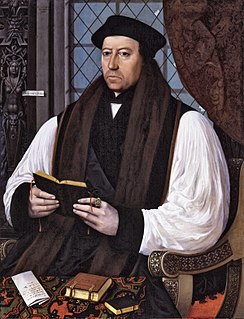Related Research Articles

Thomas Cranmer was a leader of the English Reformation and Archbishop of Canterbury during the reigns of Henry VIII, Edward VI and, for a short time, Mary I. He helped build the case for the annulment of Henry's marriage to Catherine of Aragon, which was one of the causes of the separation of the English Church from union with the Holy See. Along with Thomas Cromwell, he supported the principle of royal supremacy, in which the king was considered sovereign over the Church within his realm.

The Thirty-nine Articles of Religion are the historically defining statements of doctrines and practices of the Church of England with respect to the controversies of the English Reformation. The Thirty-nine Articles form part of the Book of Common Prayer used by both the Church of England, the U.S. Episcopal Church, and the Anglican Church of North America (ACNA) among other denominations in the worldwide Anglican Communion and Anglican Continuum.

John Rogers was an English clergyman, Bible translator and commentator. He guided the development of the Matthew Bible in vernacular English during the reign of Henry VIII and was the first English Protestant executed as a heretic under Mary I of England, who was determined to restore Roman Catholicism.

Hugh Latimer was a Fellow of Clare College, Cambridge, and Bishop of Worcester during the Reformation, and later Church of England chaplain to King Edward VI. In 1555 under the Catholic Queen Mary I he was burned at the stake, becoming one of the three Oxford Martyrs of Anglicanism.

Nicholas Ridley was an English Bishop of London. Ridley was burned at the stake as one of the Oxford Martyrs during the Marian Persecutions for his teachings and his support of Lady Jane Grey. He is remembered with a commemoration in the calendar of saints in some parts of the Anglican Communion on 16 October.

John Frith was an English Protestant priest, writer, and martyr.

Jerome of Prague was a Czech scholastic philosopher, theologian, reformer, and professor. Jerome was one of the chief followers of Jan Hus and was burned for heresy at the Council of Constance.

Rowland Taylor was an English Protestant martyr during the Marian Persecutions.
The Supplication against the Ordinaries was a petition passed by the House of Commons in 1532. It was the result of grievances against Church of England prelates and the clergy. Ordinaries in this Act means a cleric, such as the diocesan bishop of an episcopal see, with ordinary jurisdiction over a specified territory.
Nicholas Shaxton was an English Reformer and Bishop of Salisbury.

Thomas Harding was a sixteenth-century English religious dissident who, while waiting to be burnt at the stake as a Lollard in 1532, was struck on the head by a spectator with one of the pieces of firewood, which killed him instantly.

Walter Milne, also recorded as Mill or Myln, was the last Protestant martyr to be burned in Scotland before the Scottish Reformation changed the country from Catholic to Presbyterian.
Simon Fish was a 16th-century Protestant rebel and English propagandist. He is best known for helping to spread William Tyndale's New Testament and for writing the vehemently anti-clerical pamphlet Supplication for the Beggars which the Roman Catholic Church condemned as heretical on 24 May 1530. His pamphlet can be seen as a precursor to the English Reformation and the Protestant Reformation. Fish was eventually arrested in London on charges of heresy, but he was stricken with bubonic plague and died before he could stand trial. His widow married vocal reformer James Bainham, and then became a widow again in April 1532 when Bainham was burned at the stake as a heretic.

John Forest was an English Franciscan Friar and martyr. Confessor to Queen Catherine of Aragon, Forest was burned to death at Smithfield for heresy, in that he refused to acknowledge the King as head of the church.

The English Reformation took place in 16th-century England when the Church of England broke away from the authority of the pope and the Roman Catholic Church. These events were part of the wider European Reformation, a religious and political movement that affected the practice of Christianity in western and central Europe.
William Tracy was an English justice of the peace and prominent early Lutheran convert. After his death both his will and his remains became caught up in the struggle around the Protestant Reformation in England.
Edward Crome was an English reformer and courtier.

Henry Forrest or Forres, was a Scottish martyr.
John Tewkesbury was a Paternoster Row leather merchant in London and Protestant reformer, convicted of heresy and burned at the stake in West Smithfield, London, on 20 December 1531.
References
 This article incorporates text from a publication now in the public domain : "Bainham, James". Dictionary of National Biography . London: Smith, Elder & Co. 1885–1900.
This article incorporates text from a publication now in the public domain : "Bainham, James". Dictionary of National Biography . London: Smith, Elder & Co. 1885–1900.